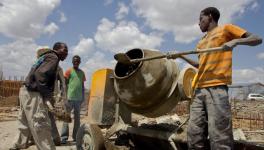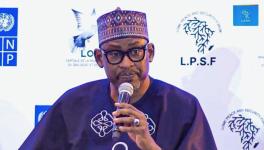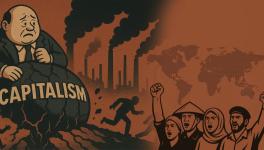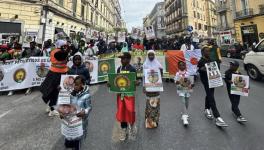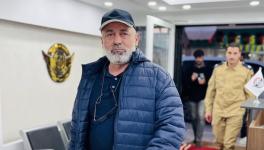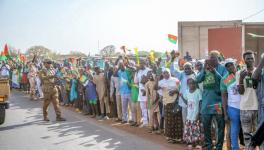Belgium Returns Remains of Assassinated Congo Leader Lumumba. What About Justice?
Photo: Nationaal Archief
Over six decades after his assassination, Belgium has repatriated the mortal remains of Congolese independence leader and Prime Minister, Patrice Lumumba. Belgian Prime Minister Alexander De Croo presented Lumumba’s gold-crowned tooth to his family at a ceremony held at the Egmont Palace in Brussels on Monday, June 20. The remains were placed in a casket and taken to the embassy of the Democratic Republic of the Congo (DRC).
The casket will be flown to the DRC where a three-day national mourning period will be observed between June 27 and 30, marking the 62nd anniversary of independence from Belgium. This is an important process for Lumumba’s family, who have struggled for years to have his remains rightfully repatriated. His son, Roland, stated last week that this would mean that his family would be able to “finish their mourning”.
At the same time, Congolese activists have fiercely condemned the fact that no one has been held accountable for the assassination till date.
At the ceremony in Brussels on Monday, Prime Minister De Croo stated that Belgium bore “moral responsibility” for the killing. Earlier this month, King Philippe, a descendant of Leopold II, similarly expressed “deepest regrets for the wounds of the past.” Belgium has continued to evade its legal responsibility for its colonization and crimes against the Congolese people. It has not issued a formal apology or made any attempt to provide reparations.
Speaking to Peoples Dispatch, Congolese activist and researcher Kambale Musavuli stated, “What June 20, 2022 means for many Congolese is that this is the day that Lumumba’s executioner was exposed to the world. Lumumba’s tooth was displayed and put in an empty coffin, then a circus ensued with a procession of “honor” and speeches. On that day, Belgium took no responsibility for the killing of Patrice Lumumba. No action was taken to launch a criminal investigation into how the tooth was removed from his body and how it ended up in Belgium. No call for justice!”
He continued further, “This seems to be an attempt not only to erase the past, but to bury the one evidence we have of the brutal murder of Lumumba.”
“A Pan-African affair”: Congolese independence in the African anti-colonial struggle
Patrice Lumumba was a Pan-Africanist revolutionary and independence leader who became the first democratically-elected Prime Minister of the present-day DRC in 1960. He was a beloved icon across Africa for his role in the fight for liberation against colonialism. In what would become the last letter he wrote to his wife, Lumumba famously stated, “The day will come when history will speak. But it will not be the history which will be taught in Brussels, Paris, Washington, or the United Nations…Africa will write its own history and in both North and South it will be a history of glory and dignity.”
A leader of the Congolese National Movement (MNC), Lumumba was chosen by the people to lead an independent Congo emerging from brutal colonial rule which began under Belgium’s King Leopold II in the late 19th century and killed an estimated over 10 million people between 1885 and 1908.
Lumumba had been steadfastly committed to Pan-Africanism, attending the All-African People’s Conference in newly-liberated Ghana in 1958, whose chief demands included “the immediate and unconditional accession to independence of all African peoples, and the total evacuation of the foreign forces of aggression and oppression stationed in Africa”.
As Musavuli highlighted in a previous interview, there was a sense of immediacy among the peoples gathered in Ghana to mobilize for independence immediately, to regain control of their land and resources.
This urgency accompanied Lumumba as he returned to the DRC. His election to office two years later, Musavuli stressed, took place with the support of people across the African continent, including from Chad, Cameroon, Ghana, and the Central African Republic.
“The independence of the Congo was not a Congolese affair, it was a Pan-African affair”, he stressed.
Indeed, speaking at his inaugural address in June 1960, Lumumba proclaimed, “The Congo’s independence is a decisive step towards the liberation of the whole African continent.”
Lumumba was also determined to use the country’s natural resources, which had been subject to decades of colonial and imperialist exploitation, for the benefit of the Congolese people. The question of control over Congo’s economy and resources was a concern for the US and Belgium. So, Musavuli argued, even though these powers seemed quick to hand over political independence, they refused to give the Congolese people control over their mineral resources.
This was particularly true of the US, who at the time was exploiting Congo’s cobalt and uranium during the Cold War. Weeks after Lumumba’s speech, then US President Dwight Eisenhower stated during a meeting of the National Security Council that the Congolese leader should be “eliminated.”
Lumumba’s assassination and his enduring legacy
Sure enough, just months after assuming office, Lumumba was overthrown in a coup, arrested, tortured and then brutally killed on January 17, 1961 by counter-revolutionary forces backed by Belgium and the US. He was 35 years old at the time. In 2013, a letter addressed by Lord Lea to the London Review of Books also alleged the complicity of UK’s intelligence agency MI6 in the assassination.
The Western powers proceeded to establish a dictatorship in Congo led by Mobuto Sese Seko, who remained in power for the next 30 years. His rule was marked by brutal repression of the opposition and the plunder of the DRC’s natural resources by transnational corporations.
Lumumba was killed alongside his comrades Joseph Okito and Maurice Mpolo by a firing squad. However, the violence did not end there. Two days later, a group led by Belgian police commissioner Gerard Soete exhumed Lumumba’s body from a shallow grave, dismembered it, and then dissolved the body in acid. This was done to prevent any memorialization of his life and martyrdom, or as Belgian researcher Ludo De Witte stated in his book, “Not only had Lumumba been physically eliminated, his life and work were not to become a source of inspiration for the peoples of Africa either”
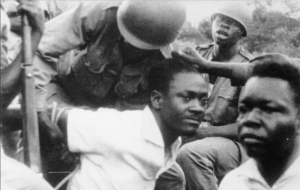
Lumumba captured by Mobuto’s soldiers (Photo: africaimprescindible.org)
In a horrifying admission in 1999, Gerard Soete not only confirmed his role in the assassination, but added that he had stolen and kept two of Lumumba’s teeth and fingers “as a type of hunting trophy.” He claimed to only have a gold-crowned tooth in his possession at the time. After Soete died, it was discovered in 2016 that his daughter Godelieve had kept the remains. The revelations sparked mass outrage. Following a complaint by the Lumumba family, Belgian authorities seized the tooth. In September 2020, a Belgian judge ruled that the remains must be repatriated to the family.
Lumumba will now finally be laid to rest in the capital of Kinshasa.
“The horrific manner in which Lumumba’s body was dismembered begs the question of how the Belgians saw the Congolese and their land. Ravaged for centuries where different imperial forces came to extract humans for slavery, rubber for the tires of our cars, uranium to bomb Japan, and copper to rebuild Europe after the World Wars, Congo saw its first prime minister be dismembered, and his tooth covered in gold also extracted and [having] found its way to Belgium”, stated Musavuli.
He added further, “As the tooth will be laid to rest in Congo in the days to come, we must renew our efforts to demand that a criminal investigation be held to identify those who killed Lumumba, and pay reparations to his family, the Congolese people, and Africa!”
Ludo De Witte described Lumumba’s murder as “the most important assassination of the 20th century.” Musavuli added, “It robbed the Congo of its future, and also derailed the liberation of the African continent given Congo’s role in the construction of Pan Africanism.” However, despite the West’s attempts to erase Lumumba from the popular consciousness, his legacy has endured.
Writing from the Thysville Prison after the coup, Lumumba had stated, “I know and feel deep in my heart that sooner or later my people will rid themselves of their internal and external enemies, that they will rise up as one in order to say ‘No’ to colonialism, to brazen, dying colonialism, in order to win their dignity in a clean land.
We are not alone. Africa, Asia, the free peoples and the peoples fighting for their freedom in all corners of the world will always be side by side with the millions of Congolese who will not give up the struggle while there is even one colonialist or colonialist mercenary in our country.”
Get the latest reports & analysis with people's perspective on Protests, movements & deep analytical videos, discussions of the current affairs in your Telegram app. Subscribe to NewsClick's Telegram channel & get Real-Time updates on stories, as they get published on our website.











